4 expressions about the head
CHALLENGE #20
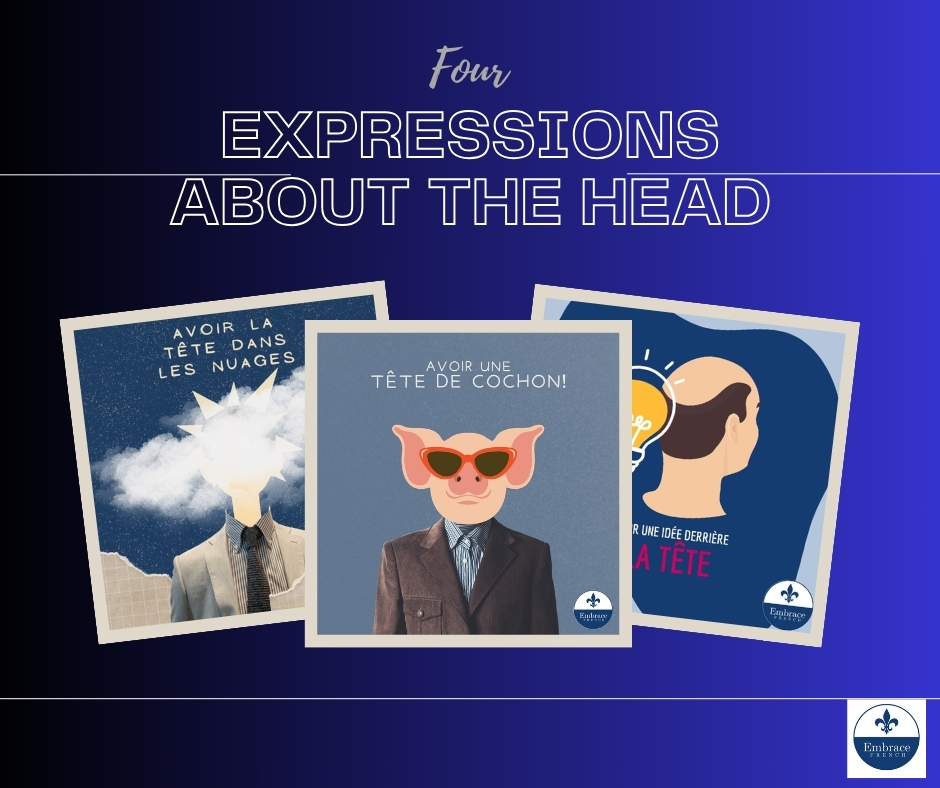
Today, I would like to teach you some expressions that aren’t exclusive to Quebec. In fact, the expressions that follow are used in a large part of the French-speaking world.
As I explained in the first post on expressions , Quebecers use them a lot when speaking, and often the expression will be the only sentence used to describe a situation. So it’s pretty important to master them, whether they’re unique to Quebec or widespread throughout the French-speaking world.
In this post, we will take a look at four expressions that all mention the head. As the head is the center of thought, these are all figurative expressions (very graphic) which probably won’t make any sense if you take them literally.
It’s not essential for you to use the expressions when you speak, but as you will see, it’s vital that you know their true meaning, should anyone use them when speaking to you.
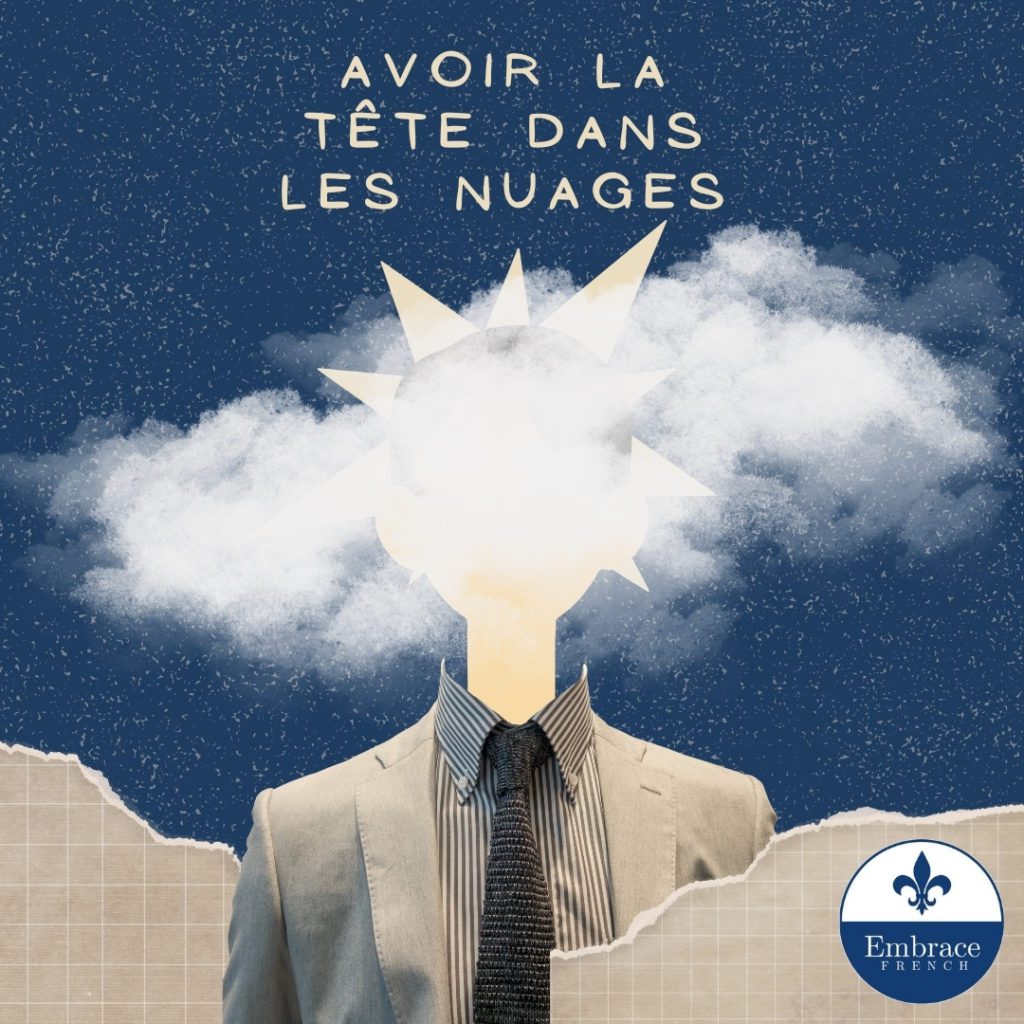
Expression #1: Avoir la tête dans les nuages
The expression “avoir la tête dans les nuages” (having your head in the clouds) is used to describe a person who is often dreamy, daydreaming or disconnected from immediate reality. It suggests that such a person is often lost in thoughts, imaginings or fantasies, to the point of not being fully aware of what’s going on around them.
In short, someone with “their head in the clouds” is often distracted by their own thoughts, or not fully attentive to what’s going on in the real world.
It’s not an insult, but it always has a slightly negative connotation because it implies that either the person is not paying enough attention, or doesn’t realize what’s really going on. However, it can also be used more neutrally to simply describe someone with a penchant for imagination or deep thought.
Examples of how I use it in my life:
- For the neutral use of it, I can, for example, talk about a friend who uses her time on public transport to simply let her thoughts go. I could talk about her by saying “She doesn’t like to read or use her cell phone on the bus, she prefers ‘avoir la tête dans les nuages’ (to have her head in the clouds) for a good part of the commute.”
- This expression is also used when people are newly in love. For example, if you’re 16 years old and your grades have dropped since you’ve had a boyfriend/girlfriend, it’s certain that your mother will say to you, “ Now, you’re going to have to stop ‘avoir la tête dans les nuages’ (having your head in the clouds) and concentrate on your schoolwork!”
- Negative usage is mainly, but not exclusively, linked to the world of work. This expression will be used to explain why you don’t dare trust someone completely. For example, if the company needs to attend a trade show, someone might say “I didn’t dare ask Pierre to be in charge of the materials; he always « a la tête dans les nuages » (has his head in the clouds) so much, it’s obvious he was going to forget something!”
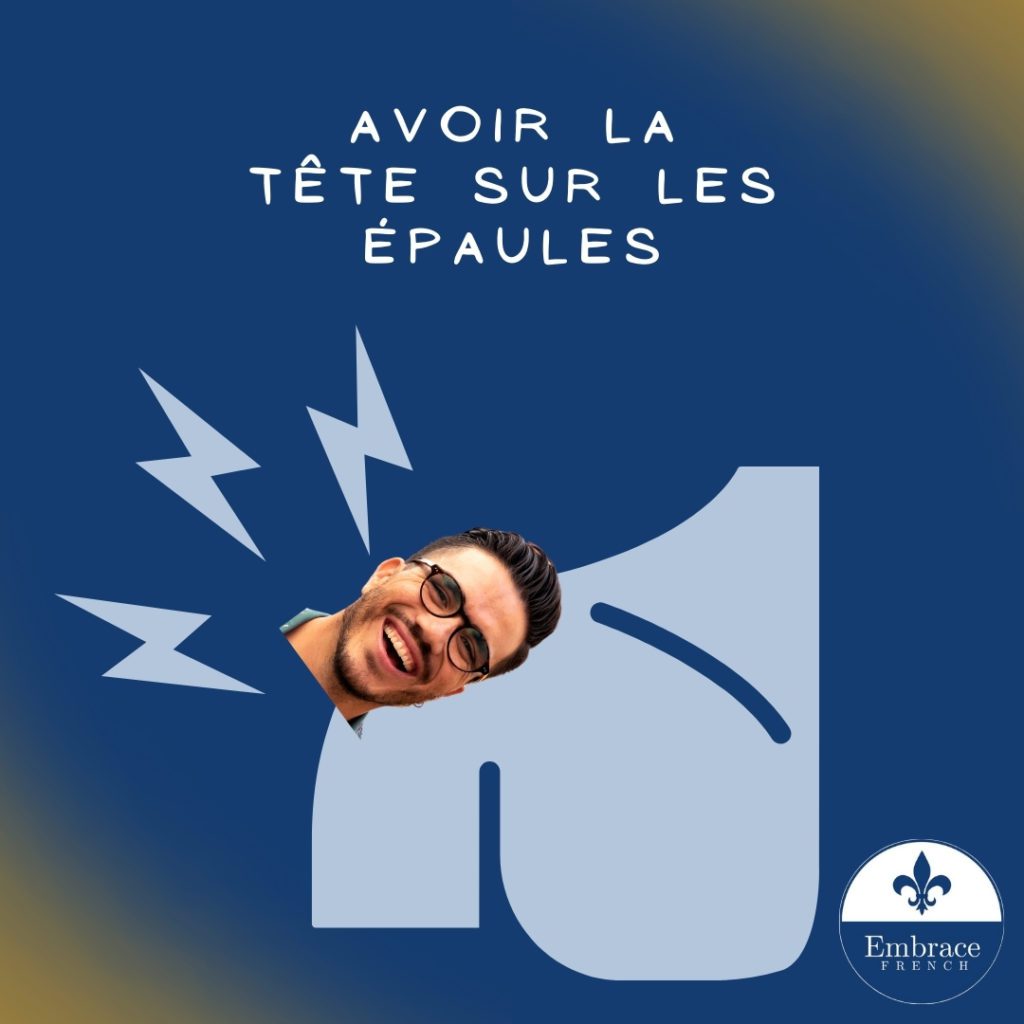
Expression #2: Avoir la tête sur les épaules
« Avoir la tête sur les épaules » (Having a head on one’s shoulders) is the exact opposite of the previous expression. Someone with « la tête sur les épaules » is sensible, reasonable and responsible. This implies that the person makes well-considered decisions and uses common sense in their actions. In other words, they are aware of the realities and consequences of their choices, and act in a mature and balanced manner.
In other words, someone with a good head on their shoulders could be described as a “serious person”.
The expression emphasizes a person’s ability to manage their life, problems and decisions in a rational, composed way, without getting carried away by their emotions or acting impulsively. « Avoir la tête sur les épaules » is often seen as a positive quality, showing a good ability to cope with the challenges of everyday life.
Examples of how I use it in my life:
- This expression is used to refer to teenagers or young adults who are a little more “responsible” than people of the same age. For example, a parent might say of their 16-year-old “I trust him/her with his/her academic class choices because « il/elle a toujours eu une tête sur les épaules » (he/she has always had a head on his/her shoulders) and I know he/she makes thoughtful decisions for his/her future.”
- In professional life, we use this expression to explain why we trust someone. For example, I might say “Although this is Charlotte’s first time organizing the investors’ meeting, I know that everything will be ready and well done because, since her first day here, « elle a toujours eu une tête sur les épaules » (she always had a head on her shoulders).
- Generally speaking, this expression is used as a quality. For example, a bachelor might describe his perfect person as having a good sense of humor, loving hiking and dogs, and « ayant une tête sur les épaules » (having a head on one’s shoulders).
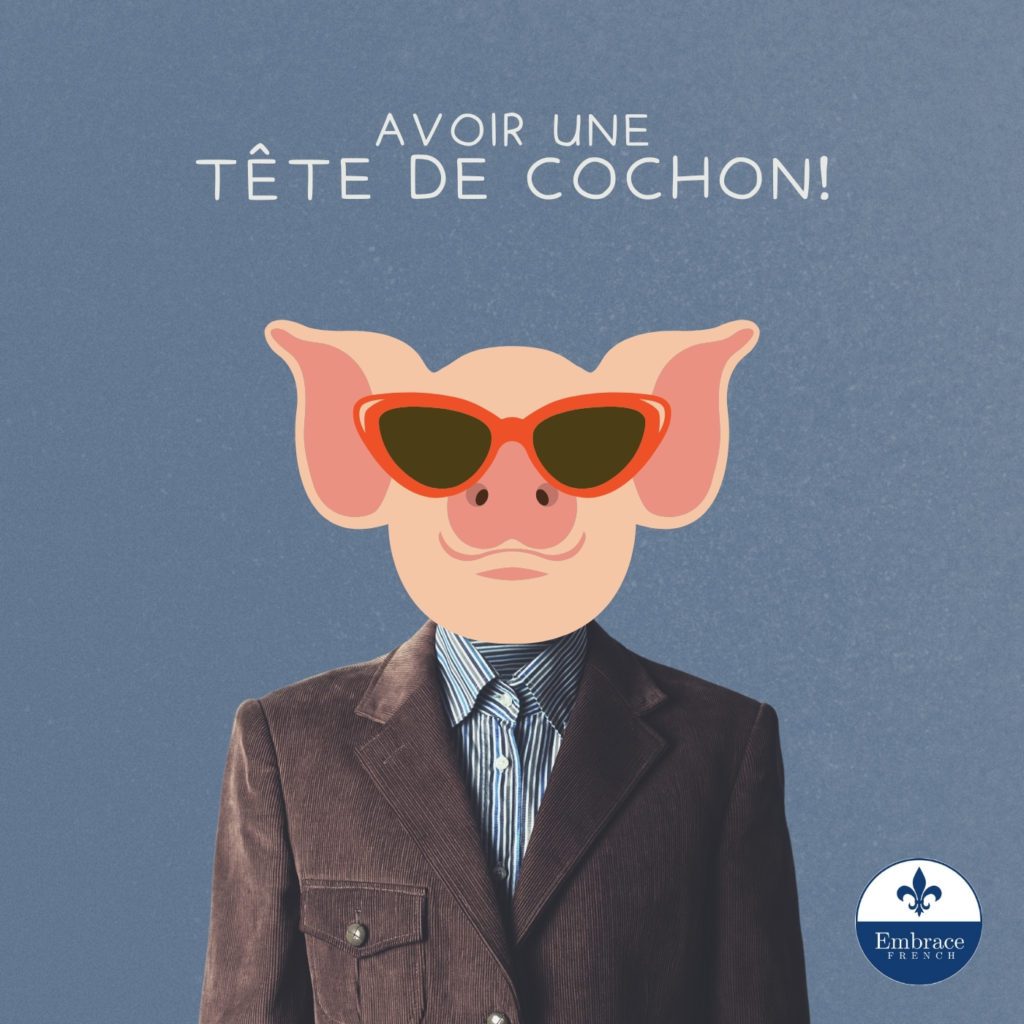
Expression #3: Avoir une tête de cochon
I smile when I see this expression because it’s clearly often used in my extended family! You’ll see in the examples 😆 .
The expression “Avoir une tête de cochon » (to have a pig’s head) is used to describe a person who is stubborn, obstinate or refuses to change his or her mind despite arguments or advice. It refers to the animal, the pig, known for its tenacity and resistance to giving in or submitting.
It can also be used more positively to refer to someone who persists in a particular direction despite challenges or opposition.
Although it can be used to speak negatively of a person, I think it’s more often used neutrally to simply describe someone with strong determination or who stands firm for what they believe in… which is my whole family! hahahaha
Examples of how I use it in my life:
- My grandmother really wanted to study and, with the « tête de cochon » she had, she left for Quebec City at age 16 (in 1940) to take a 6-month course, against her parents’ advice.
- When I first started out my business, my friends and family were a little worried for me, but they all said that with « la tête de cochon » I have, I could overcome any obstacle.
- My mother, who always wanted to learn English, decided that I would. So she sent me to school in English on Saturdays when I was little. By the time I was in grade 5 (age 11), I was also taking English classes at school, and because of the Saturday school, I was really bored by the classes at school, because I already knew everything. I asked my mother if I could stop going to school on Saturdays. I was 11 years old. It was obvious that I wanted to do something else with my Saturdays. My mother took me at my word and said, “If it’s really that you already know everything, I imagine you’ll get 100% on your next report card… if you get 100%, you can quit Saturday school.” With « la tête de cochon » that I have, I’ll let you guess what my grade was on my report card! (Hint: I didn’t go back to Saturday school.)
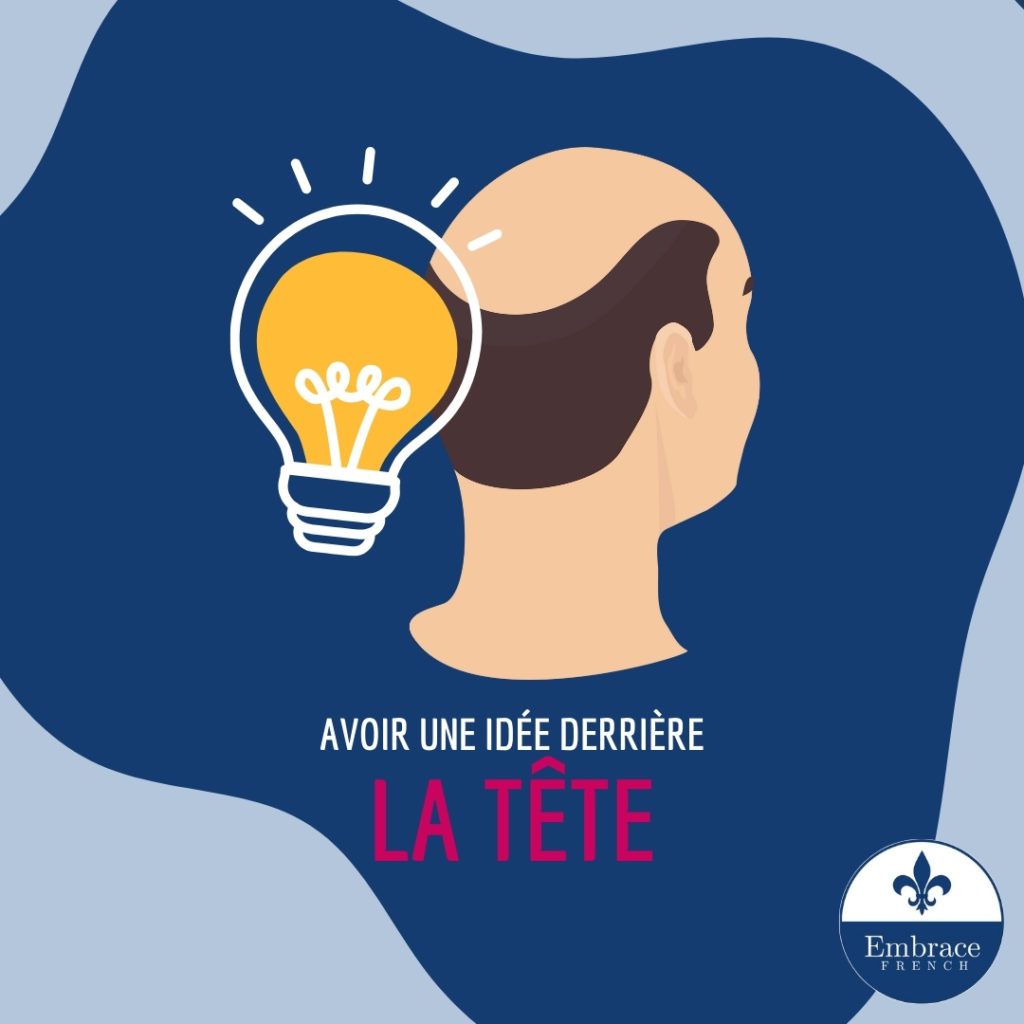
Expression #4: Avoir une idée derrière la tête
The expression « Avoir une idée derrière la tête » (to have an idea behind of one’s head) is used to describe the fact that a person has a secret or hidden plan, intention or project. It suggests that this person has a thought or intention that he or she does not openly reveal to others, often for personal or strategic reasons.
In short, when someone “a une idée derrière la tête”, it usually means that they have something in mind that they’re keeping to themselves, that they haven’t yet revealed.
Examples of how I use it in my life:
- If you have kids, you’re likely to use this expression several times a week! You know, when you walk into your child’s bedroom and he stands stiffly staring at you without saying a word, and you ask him what he’s doing, but he replies “nothing”… Your child clearly « a une idée derrière la tête »!
- In the context of a personal project, we use this expression to avoid talking too quickly about something. For example, if you want to change direction in your career, if someone asks you how far along you are in this project, you might say “J’ai une idée derrière la tête » , but it’s too early to tell everyone about it just yet.”
- Generally speaking, this expression can be used in any field. I could say “I think my colleague « a une idée derrière » la tête because for the last two weeks, at lunch, all he’s been doing is looking at magazines about Europe.”
Your challenge:
In a previous challenge, I told you about the federal government’s portal for learning French. Today, I would like you to do the following exercise to learn even more expressions about the head!
Let me know in the comments what your favorite expression is!
Have you downloaded your free guidebook package?

You can now download a free learning package on the 20 most commonly used verbs in French, conjugated in the present tense. This set includes an ebook with all the verbs and a sentence for each person (je, tu, il, elle, nous, vous, ils, elles), an Excel file to add all the concepts from the ebook to your flashcards application and a video where you can hear me pronounce these verbs and sentences. And it’s free! Download it now!


